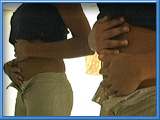How do you know if you are pregnant?
 Detecting pregnancy is easier than most women may know. And with quick tests at our fingertips, finding out if you’re a new mom can be confirmed in just a matter of minutes. News Five’s Healthy Living focuses this week on the process, and the changes the woman goes through during pregnancy.
Detecting pregnancy is easier than most women may know. And with quick tests at our fingertips, finding out if you’re a new mom can be confirmed in just a matter of minutes. News Five’s Healthy Living focuses this week on the process, and the changes the woman goes through during pregnancy.
Marleni Cuellar, Reporting
A question that many women will ask is “Am I Pregnant?” Until the pregnancy test reads positive, many times it seems to be a guessing game. Some suspect while others hope that they are pregnant. According to Obstetrician & Gynecologist Dr. Mauricio Navarrete, women don’t need to wait for a missed period since there are some early indicators. For some women, early symptoms of pregnancy begin in the first few weeks after conception.
Dr. Mauricio Navarrete, Gynecologist & Obstetrician
“Missing the last period would be a first sign that a woman has to look for to thinking that she may be pregnant. Now there are some changes that happen before she actually misses her period. Some of them are very subtle and she may not know them. Some of them might be a bit noticeable. Breast tenderness is a very consistent sign of pregnancy and that may occur about a week after conception which is normally about a week before the next missed period. Breast tenderness in both breasts a generalized discomfort which may be accompanied by a little bit of swelling. There might also be tiredness. These are more vague of course: tiredness, sleepiness, headaches. Many women are actually concerned of the fact that they might develop headaches. But in the first few weeks of pregnancy headaches are very common and can actually be attributed to an early sign of pregnancy.”
Many of these early indicators are a result of the spike in hormone levels. Another early indicator which may be a bit misleading is spotting.
Dr. Mauricio Navarette
“It’s something that many women would experience a few days before they were suppose to experience their menstrual cycle that might be accompanied by a bit of cramping .It is usually what we call implantation bleeding. Pretty much what it means is that as the embryo enters the uterine cavity and it implants itself. It lodges itself inside the womb. It may cause the womb to bleed a bit.”
Morning sickness, which includes nausea and vomiting, is a symptom experienced by some women. It doesn’t present itself until three to four weeks after conception and it is not experienced by all pregnant women. But these symptoms aren’t unique to pregnancy and it is possible to be pregnant without experiencing them. The best way and only way to be sure is to take a test.
Dr. Mauricio Navarette
“You have two types of pregnancy tests. The kind that you can get over the counter; the urine based pregnancy test. These are about ninety-seven percent accurate. However, they will not detect a pregnancy normally before you’ve missed a period. So women have to miss a period and about a week later a pregnancy test with urine should become positive. This is different from blood pregnancy test. Blood pregnancy test measure a hormone called HCG which is a hormone produced only by the placental tissue in a pregnancy. HCG starts being produced about five days after conception.”
The blood test, which is ninety-nine percent effective, is usually used to confirm pregnancy. One of the main benefits of early confirmation is the ability to change habits that may cause a high risk pregnancy.
Dr. Mauricio Navarette
“A high risk pregnancy is by definition a pregnancy that maybe complicated by fetal death, by fetal underdevelopment or by maternal problems. All the systems and organs within the baby form in the first trimester so if there is any mistake or any problems during the first trimester that will impact the growth of the baby during the whole pregnancy and even its neurological development after the baby is born. So I would say the first trimester is actually the most important in pregnancy in predicting how a child may live afterwards.”
As for some tips on having healthy pregnancy, Dr. Navarrete offers some clarification on myths and a bit of helpful advice.
Dr. Mauricio Navarette
“The most common myths that we would find early in pregnancy is that women can’t stretch, they can’t bend down, sometimes they’re told that they should not be having sex. These are all really myths. Remember that baby or the pregnancy is largely within the uterus which is like a protective capsule so doing some mild or moderate physical activity which might include sex, working at home or working at a job will not really impair any pregnancies. So start vitamins early, eat right without any restrictions, not to overeat of course because you don’t want to have a lot of weight gain during the pregnancy, to cease smoking to cease drinking and to incorporate some exercise into the lifestyle. Women who exercise tend to do much better during pregnancy during labor and delivery and recover much faster also. That’s been proven.”
